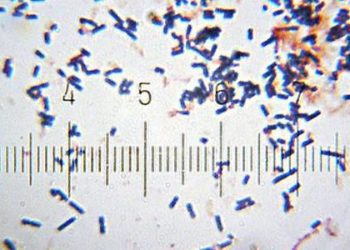Novel prion disease associated with diarrhea and autonomic neuropathy
Image: PD
1. A novel prion disease caused by a truncation mutation, Y163X, in the gene encoding prion protein (PRNP) was identified.
2. Unlike other known human prion diseases, the phenotype of the PRNP Y163X mutation is associated with a non-neurologic presentation, widespread deposition of prion protein amyloid in systemic organs, and slow disease progression.
Evidence Rating Level: 3 (Average)
Study Rundown: Prion diseases are transmissible neurodegenerative disorders that may be sporadic, genetic, or acquired. Prion proteins are abnormal isoforms of host-encoded glycoproteins that propagate disease through recruitment and misfolding of additional host proteins. Mutations in the gene encoding prion protein (PRNP) are associated with inherited forms of prion diseases. In this study, the authors characterize a novel prion disease with a PRNP truncation mutation affecting a large British kindred. While most prion diseases present as rapidly progressing neurodegenerative conditions, Y163X PRNP manifested initially as chronic diarrhea and was slow in progression. Individuals developed symptoms of a predominantly sensory and autonomic neuropathy in early adulthood. Symptoms advanced to cognitive decline and seizures when the individual was in their 40s or 50s. Neuropathological examination during end-stage disease showed extensive peripheral deposition of prion protein as well as a unique pattern of abnormal prion protein fragments in brain tissue. These findings expand the current understanding of human prion diseases. In patients with non-neurologic presentations, the possibility of prion disease should be considered.
Prion proteins in the cell are normally tethered to the cell membrane by GPI anchors. Previous studies using transgenic mice lacking suggest that deposition of prion protein may be related to the loss of the GPI anchor. The relative contributions of the GPI anchor and truncated protein to the pathology of this condition are still unknown. Further studies with transgenic mice expressing the Y163X mutation are needed.
Click to read the study in NEJM
Relevant Reading: Inherited prion disease with an alanine to valine mutation at codon 117 in the prion protein gene
Study Author, Dr. John Collinge, MD, talks to 2 Minute Medicine: Professor of Neurology, Head of Department, Department of Neurodegenerative Disease, UCL Institute of Neurology; Director, MRC Prion Unit
“I think the main impact on clinical practice will be prion protein gene testing in patients with undiagnosed diarrhea and neuropathy, or hereditary sensory and autonomic neuropathy. The main future direction is to develop a transgenic animal model of this disease.”
In-Depth: This study characterized a novel prion disease in a large British kindred through longitudinal clinical assessments over a period of 20 years along with genealogical, neuropsychological, neurophysiological, neuroimaging, pathological, molecular genetic, and biochemical studies. Six of eleven affected family members were studied in detail. Autopsy or biopsy samples were obtained from 5 family members. The clinical syndrome was found to be similar in all the patients and was transmitted as a dominant trait. Electrophysiology studies showed a progressive, length-dependent, predominantly sensory, axonal polyneuropathy. Impairment of memory and executive function was found when individuals were in their 50s. The deposition of prion protein amyloid was seen throughout peripheral organs, including the bowel and peripheral nerves. Transmission studies with 24 mice from three lines did not show any clinical signs of prion disease up to 600 days after inoculation.
By Xu Gao and Adrienne Cheung
© 2013 2minutemedicine.com. All rights reserved. No works may be reproduced without expressed written consent from 2minutemedicine.com. Disclaimer: We present factual information directly from peer reviewed medical journals. No post should be construed as medical advice and is not intended as such by the authors, editors, staff or by 2minutemedicine.com. PLEASE SEE A HEALTHCARE PROVIDER IN YOUR AREA IF YOU SEEK MEDICAL ADVICE OF ANY SORT.






